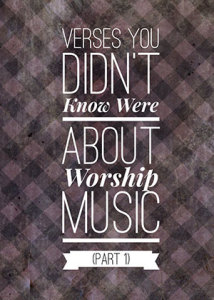Verses About Worship Music You May Have Overlooked (Part I)

As church musicians, we sometimes long for more specific, direct instruction from God’s Word on what our music should sound like. But, have we overlooked the not so obvious verses about worship music?
As we try to balance energy with reverence, new with established, simple with complex, and a myriad of other considerations, it can seem that things would be much easier if the Lord had given us an Epistle to the Music Directors.
Yet, as in so many areas of ministry, there is sufficient direction in Scripture on what our worship music should be like…if we skillfully apply God’s principles.
What Our Worship Music Should Be Like
I would like to introduce you to a passage that you may not have ever thought about in connection with music, but which on closer look has a great deal to say about it.
The second chapter of I Corinthians begins this way:
“And I, brethren, when I came to you, came not with excellency of speech or of wisdom, declaring unto you the testimony of God. For I determined not to know any thing among you, save Jesus Christ, and him crucified. And I was with you in weakness, and in fear, and in much trembling. And my speech and my preaching was not with enticing words of man’s wisdom, but in demonstration of the Spirit and of power: That your faith should not stand in the wisdom of men, but in the power of God.” (I Corinthians 2:1-5)
Let’s establish exactly what point Paul is making with these statements. It is a critical point because, as the conclusion of the passage notes, it affects whether the Corinthian church places its eternal destiny in man or God. That critical point is the manner in which Paul communicated to his audience the gospel of Christ.
Paul is not making a difference between messages, as he does in Galatians 1:6-7 (” I marvel that ye are so soon removed from him that called you into the grace of Christ unto another gospel: Which is not another; but there be some that trouble you, and would pervert the gospel of Christ”). Rather, he is talking about two different ways in which he could have conveyed the true testimony of God.
Wisdom of Men
The first way would have been that of “excellency of speech” and “enticing words,” summarized as the “man’s wisdom.” Don’t skip over these terms, because they refer to a massively important part of that day’s culture.
Just as our culture enjoys music, film, and theater that awakens emotion within us, Greeks and Romans of Paul’s time were entertained by masters of rhetoric. Audiences willingly allowed these highly trained orators to take them to the depths of sorrow and the heights of ecstasy with their carefully worded speech.
It is difficult for us to understand the popularity that these orators held, but we can get some idea by looking at the way the public today esteems artists that have the power to affect their emotions. Country singers, skilled actors, and others with the ability to draw a tear or a smile are today’s equivalent of Greek and Roman experts in rhetoric.
It’s likely that Paul could have skillfully used the tools of rhetoric on his audience if he had wanted to. He was quite capable speaking in public, even to members of royalty. His education was stellar, and the mastery of Greek that he displays in his letters shows that he could use language with expertise.
But what does Paul say about oratory as it relates to the gospel of Christ? He flatly refused to employ it. He made a conscious effort to avoid using rhetorical devices that might sway his audience members’ emotions without truly changing their hearts.
The Application
Proponents of worship music that employs popular music styles often point to the fact that audience members clearly have an intense worship experience with God. They contrast “dead” traditional services with their energetic worship style.
But signs of emotion are not always signs of truth-based, God-centered worship. Even a song with a doctrinally sound text is capable of distracting a person from the Lord instead of directing them toward Him if the music’s emotional “punch” drowns out the text’s message.
Remember, Paul talked about refusing to communicate the testimony of God using men’s rhetorical devices. He knew that clothing the gospel in emotion-heightening language could easily inspire his listeners to respond with a faith that would, in the end, be rooted in Paul’s ability to speak instead of in God’s ability to save.
In the next post, we will examine the other side of the coin—the power of God—and consider how we can ensure that our music ministry gets its power from God instead of men.
Share with your thoughts concerning verses about worship music below.